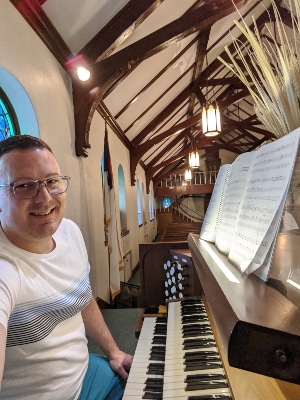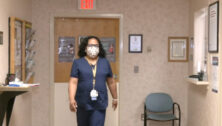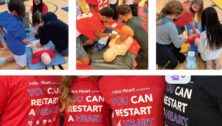Combatting Provider Burnout and Stress with Music

Stress. If you weren’t well-acquainted with the term prior to the pandemic, you most likely are now.
When we encounter a stressor, our adrenal gland starts producing cortisol, a useful hormone that in the short term helps us focus and summon the energy we’re going to need to navigate the moment. But when we remain in this state for long periods — a condition referred to as chronic stress — we put ourselves at increased risk of developing an anxiety disorder, depression, and burnout.
Health care providers have long been susceptible to burnout. But since the COVID-19 pandemic, those rates have reached staggering new highs. In a 2020 survey conducted by the American Nurses Association, 62 percent of nurses reported experiencing symptoms associated with burnout. Among physicians, 47 percent reported feeling burned out in a 2021 survey that included more than 13,000 respondents across 29 specialties.
While there’s no one-size-fits-all solution, some have leaned on their passion for music. Listening to and playing music have been shown to have a number of physical and mental benefits, including helping people cope with the pandemic. Music has also been found to reduce cortisol levels, help with sleep, reduce depression, and even reduce burnout.
None of these benefits come as news to four lifelong musicians who work at Chester County Hospital (CCH). Long before the pandemic, their talent provided an escape for them from the everyday rigors of their responsibilities.
And they aren’t alone — across Penn Medicine, providers have utilized their love of music, from the Penn Med Symphony Orchestra (made up of medical students, faculty members, researchers, nurses, and more) to creative music therapy programs. As you’ll see, some may not always feel like playing or singing after a demanding day or week, but they’re always grateful they did.
How Music Brings Families Together

Lead Pharmacy Technician Cheryl Toney’s favorite place to sing is in her church choir, standing right between her two daughters, ages 14 and 19. In those moments, she’s doing something that’s brought her immense joy throughout her life with two of the people she loves most in the world.
But there’s more to it than that.
“A lot of people in my family struggle with depression,” said Toney, who is a lead technician in the outpatient pharmacy at CCH. “I’m Black, and there’s a stigma among the Black culture about asking for help with a mental health condition. However, I know that singing and listening to music can trigger the release of dopamine and serotonin, the same chemicals found in antidepressants.”
Every Sunday morning, her immediate and extended family attends church together, and she sees it as “a chance to encourage them.” She also sings at family get-togethers.
“I think it just helps us all cope and feel closer to each other,” she said.
Toney credits her father, whom she describes as her best friend, for initiating her appreciation of music and love for singing.
“He loves music and he loves singing, but he’s a terrible singer,” she said. “Growing up, he’d wake up every weekend, put some music on, and then spend the next two days cleaning and singing.”
At work, Toney’s instituted “dance breaks,” during which she and her coworkers take a few minutes to dance and sing along to a chosen playlist. (Her go-to is a Spotify Motown station.)
“Music helps us focus and keep calm in the face of the stress that happens every day here,” she said. “If we kept our heads down for eight hours straight, we’d be mentally exhausted.”
She likes to listen to the Motown station on her drive home, too.
“That way,” she said, “the stress can fall away before I reach my family.”
The Calming Power of Music
The last thing Cathy Weidman wants to do when she gets home Thursday evenings is get back into her car and drive to band practice in Wilmington, Delaware. But her husband always manages to talk her into it, and, in the end, she’s always grateful she went.
“Once I’m there, I can play for two hours straight without even noticing,” said Weidman, a director of Medical-Surgical Services at CCH. “It really energizes me and lifts my mood.”
For the last eight years, she’s sung and played keyboard for a garage band called Chester and Bedfords. The name has a local tie, Weidman explains, as two of the original band members were from Chester County and the other two lived along Bedford Boulevard, in Wilmington. Her late husband played lead guitar, and Weidman sang backup vocals. When he died, the remaining members asked her to remain on as their new keyboard player.
Weidman has been a singer for most of her life. In her teens and twenties, she and her older sister sang at weddings. And she sang with her church choir for 20 years. “It’s just a great outlet,” she said “It calms and centers me.”
“As a nurse, I feel that power of music can help to calm patients and relieve anxiety. I often advocate for staff to use the TV system to play calming music for patients or are anxious or suffering from dementia.”
Having always wanted to play the piano, she began taking lessons 10 years ago. She traded the piano for the keyboard at the band’s request. Although, she anticipates returning to the piano and playing more regularly when she retires in August, for now, almost all her playing time and singing come during Chester and Bedford’s weekly practices.
They dabble in rock and pop from different eras — they’re currently learning their way around Amy Winehouse’s “Valerie” — but their wheelhouse is rock songs from the sixties and seventies, namely those by The Beatles and Fleetwood Mac.
Using Music for Self-Care

Darren Girardeau was pursuing a degree in music education at West Chester University when a friend asked if he wanted to be a volunteer first responder.
“It was all downhill from there,” said Girardeau, now director of Emergency Services at CCH. “I fell in love with emergency and trauma care. And after a while, I thought, I want to make nursing my career and keep music as a hobby.”
He earned his degree in music education, but then promptly returned to school for nursing.
Girardeau started playing the piano 30 years ago as a third grader. The organ followed 10 years later when a nearby church needed someone to fill in. Its music director was the uncle of a friend. “He said he knew enough that if I played the keyboard, he could play the pedals and teach me along the way,” Girardeau said. “So that’s what we did for the first year until I learned to put them together.”
Today, he plays an electric organ at his Phoenixville church. Between the demands of his work and parenting three adopted sons, Girardeau admits it can be hard to find the time or motivation to play. Often, the only chance he gets is during Sunday-morning services. He’s able to do it because he’s a gifted sight reader, but it’s not his preference. However, he’s in the process of making music a bigger part of his life.
“One of my New Year’s resolutions was to play more often for the sheer enjoyment of it because it can be relaxing,” Girardeau said. “And it’s something I’m doing for myself. It’s a kind of self-care. I’m not taking care of patients or my family. I’m playing because I love doing it.”
Let the Music Transport You
“I wish more people in health care would consider learning an instrument,” said Chris Dearing director of Cardiology Services at CCH. “I believe it provides a peaceful retreat from the pressures of daily life. Especially with my work in nursing, where we’re constantly under pressure, you need an outlet to help reduce stress.”
Each night when he gets home from the hospital, Dearing checks in with his family and then heads to his bedroom, where he keeps an acoustic guitar. He’ll play for five to 10 minutes, just long enough to be absorbed by it.
“All of a sudden, I’ve forgotten about everything that happened at work. It’s like a reset,” Dearing said. “Listening to music has the same effect. It’s a lot like meditating for me. It just takes my current state of mind and puts it in another place.”
Whenever he can, Dearing plays solo acoustic sets at local happy hours and “pretty much anywhere that’ll have me.” He loses himself in his music then, too.
“I know I’m singing in key and it sounds good. I can hear it. And I only play songs I know I can play well. I’m sensible that way,” he said, who taught himself how to play electric guitar in high school and played with a band called Uncle Frank that performed all over Delaware County for about 10 years. “I just like to entertain and see people having a good time because of my music.”
Dearing says his “biggest thrill” is playing Irish folk songs for a crowded pub around St. Patrick’s Day. He grew up listening to his grandfather play a lot of the same songs on his accordion, and he knows just how conducive they are to mass singalongs. When it happens and he’s at the center of it, Dearing said, “it’s exhilarating.”
Connect With Your Community
Subscribe to stay informed!
"*" indicates required fields
























![95000-1023_ACJ_BannerAd[1]](https://vista.today/wp-content/uploads/2023/03/95000-1023_ACJ_BannerAd1.jpg)
























